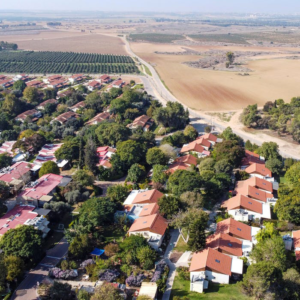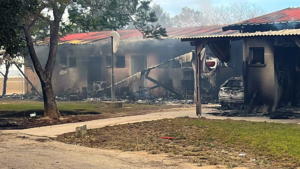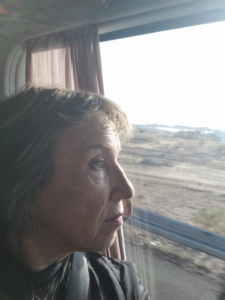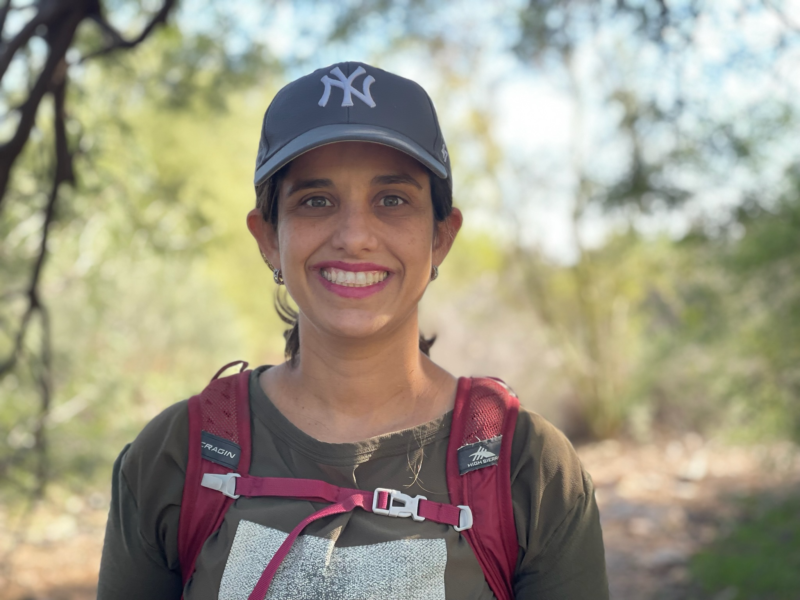By Cindy Saltzman
The first time I met Adele Raemer was during a Zoom interview. She wore a T-shirt with Hebrew letters on it that I couldn’t quite make out. When asked what it said, she replied, “Oh, I had the other one on before. I’m bilingual.” She pulled up a matching t-shirt with English letters that read, “Bring them home now.”
Between Zoom interviews, vigils, and live talks, Adele Raemer is so busy speaking out about her experience at kibbutz Nirim on October 7th, that she can’t always keep track of which language t-shirt to wear for which audience.
She also dons a new piece of jewelry which is actually a dog tag. “It says in Hebrew to bring them home now,” she explains. “And on the bottom, it says, ‘My heart is being held hostage in Gaza, 7/10/23.’ She has her close friend’s name from the neighboring Kibbutz Nir Oz engraved on the bottom. Her friend, Judih Weinstein Haggai went out on a regular sunrise walk in the field with her husband, Gadi Haggai that morning. Judih called the kibbutz nurse at 7:04 am on October 7th reporting that both she and her husband had been shot. Unfortunately, by that time the kibbutz ambulance had already been blown up. That was the last anyone heard of the couple. (Unfortunately, several weeks after this interview on December 22, it was announced that Gadi Haggai z”l was confirmed dead in Gaza. On December 28, 2023, it was confirmed that Judih Weinstein Hagai z”l was also killed).
We spoke with Adele Raemer in her temporary housing in a hotel in Eilat. (Comments are edited for brevity.)
Jewish Life Now:
Is it difficult to always go back and describe the horrors of that day?
Adele Raemer:
I survived and I see it as a responsibility as a survivor to talk about it because the world needs to know and understand what actually went on that day. Because I’m watching the news and seeing all these different groups saying that there’s an expiration date on this and that Israel is not going to be able to continue the fight much longer. That just infuriates me.
I don’t think anybody put a time stamp on the Americans when they went into
Germany to win, to be victorious over the Nazis. They did what they did for as long as it took.

JLN:
Tell us about Kibbutz Nirim.
AR:
Well, October 6th was our Kibbutz’s anniversary. We’re 77 years old. We are one of the 11 communities that were sent out into the Negev Desert in 1946.
Before I went to bed on October 6th, I told my son, who was visiting that if he doesn’t see me in the morning, it’s because I am going to get up early to take pictures of a field of wildflowers that are in bloom. I wanted to catch it at sunrise.
Thank G-d I was too lazy to get up at six the next morning because at 6:30 we started getting incoming rocket warnings…a massive barrage which was really very unusual.
In retrospect, we learned that this heavy barrage was sort of camouflaging, taking the attention, the army’s attention, everybody’s attention, away from what was the main event, which was what was going on along the border in at least 40 spots where Hamas, who had been planning this for a year or more, broke through the border. This was a supposedly impenetrable border with an underground barrier and an overground electronic fence with the highest technology.
About 20 minutes later, we got a notification that terrorists were infiltrating Israel.
We were told to go to our safe rooms. My son and I were in the saferoom from the moment the rockets began at 6:30 am. About an hour later, I ran out of my safe room to close the doors and the windows of my house. We then locked ourselves back in the safe room.
AR:
So, I ran to the safe room where my son was sleeping. And it’s a “safe” room because it’s built to protect us from rockets. It has reinforced walls and ceiling. It has a very heavy iron sleeve over the window which you close and click down to lock.
And it has a door, an iron door, which you close, and you click the handle down, and when you click the handle down, metal prongs stick into the ceiling and the floor, which prevents, if a rocket impacts your house anyplace else, it prevents an implosion from blowing the door open. The problem with the safe room is that it wasn’t built for infiltration and you cannot lock yourself in. In fact, it’s illegal to lock yourself in because if you have a medical emergency and you’re inside there, the first responders won’t be able to come and rescue you.
We often hear rocket explosions. But we’ve never heard gunfire, automatic machine gun fire inside the kibbutz. Grenades and RPGs and things were exploding all around and people were saying that they could hear people shouting in Arabic. Then all of a sudden, we started getting messages calling for help, that terrorists were at their doors. They were in their houses, and they were trying to open up the safe room doors. So, if you’re strong enough you can keep that closed, but if they’re stronger, then somebody from the outside can open it.
We also started hearing messages about houses being set on fire.
So we’re sort of following the progression of this nightmare as it was going on and wondering, “When are we going to be next?”
JLN:
So, you were just waiting for the IDF to arrive?
AR:
We have a team of first responders who are trained and armed.
My son-in-law is one of them. They’re trained for all sorts of scenarios.
But they’re trained for infiltration by one terrorist, five terrorists, not the quantity that we got.
50 to 60 terrorists were flooding into our community.
There were terrorists, and there were all of these everyday people too. They were just your average everyday Joes, everyday Mohammed in Gaza.
Apparently, they sent out a message saying, “Come on, guys, we’re going to conquer the Jews.” Come in and help us and have fun and, you know, do what you can to get your frustrations out, whatever.
There were so many regular people, just people; unarmed people and you see internal TV showing them coming through the gate. Like there was an old man with a stick and young teenagers just coming in. They set cars afire and slashed windows and broke windows and went into houses and started taking stuff out of the refrigerators and sitting down and eating. I did not think I was going to see another sunrise. I was sure this was the end.
Adele remembers hearing Arabic voices right outside her home. Then she heard someone calling them away. Once she was able to leave her house, she found broken slats on her window and realized they were on the verge of breaking into her home when other terrorists called them away.
Once the IDF finally reached the kibbutz about 7 hours later, they systematically went from house to house to make sure there were no more terrorists. When she and a group of survivors were finally walked back to the community center, where they could be protected, she wondered why the soldiers had taken such a long route around the outskirts of the kibbutz. She later learned that they were trying to spare the group even more trauma from viewing all the exposed bodies strewn across the road on the short way around.

AR:
I was finally liberated at 5:15 pm. (from 6:30 am.), that’s almost 11 hours. My son-in-law and granddaughters had to be evacuated through their window because a terrorist body was right in front of the door. As they were being evacuated, they had to duck into a shelter nearby. because the terrorists were firing their weapons.
JLN:
How are your granddaughters doing?
AR:
They’re very traumatized and it’s very difficult for them now even to be in the hotel.
We were evacuated under fire through an active war zone. We passed smoking vehicles on the side of the road, vehicles that were still burning, and charred bodies on the side of the road.
It was an active war zone.
JLN:
How has this changed you? You said earlier that your DNA was changed.
Can you explain that a little?
AR:
You know, I’ve been giving people tours through my kibbutz for years and telling our story to people who come to Nirim. I’ve always said, “I’m in touch with people in Gaza and the people that I’m in touch with believe in different things. They believe that we can live as good neighbors and we should live as good neighbors, and they believe that children should not be educated to hate.
I’ve always said that I truly believe that most Gazans are like that, that most Gazans just want the same thing that I do, to put food on their table and to have safety for their children.
But after I saw over 3000 terrorists and just regular Gazans flooding through our borders, wreaking havoc in our communities, murdering in the most barbaric ways. I’m thinking, where were the good Gazans? Where were they?
They cut babies out of their mother’s womb. They chopped children’s fingers off. They dismembered people while they were alive and they were so proud of it that they took video footage of it, which I have not seen and I will not see, but it is out there and people need to see it, to understand what it is that we’re up against.
These are monsters.
Gazan children have an end of the year play and they dress up as Gazan fighters and IDF fighters and the Gazans kill the IDF soldiers and take them hostage. These are the kids that grew up to be the monsters that came into our community on October 7th. They’ve been trained for this. They have textbooks in Gaza that teach you math.
Saying if you had 10 Jews and you kill seven, how many are left? And it’s been going on for decades.
Adele describes herself as a pacifist who has always advocated for a non-violent solution to the region’s conflict. But now, there’s been a shift.
AR:
 A switch in my DNA tells me that before we can get into diplomacy, before we can make peace, we have to make war. It’s not going to be pretty and it’s not going to be short. It’s not going to be easy. And we can’t have a timeline imposed. We can’t have a time limit on this. The IDF has to be allowed to do what they know how to do best.
A switch in my DNA tells me that before we can get into diplomacy, before we can make peace, we have to make war. It’s not going to be pretty and it’s not going to be short. It’s not going to be easy. And we can’t have a timeline imposed. We can’t have a time limit on this. The IDF has to be allowed to do what they know how to do best.






